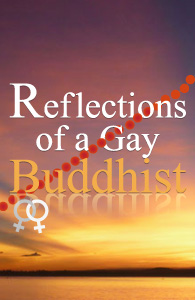The other night, I was wondering what to write in today’s column when HE Tsem Tulku Rinpoche paid a surprise visit to a small group of us and shared about the the power of imprints.

But what are imprints? They are the environmental effect that circumstances and actions have on us which mould our characters. For example, if we were born in a family where our parents are always fighting, we may fight with our partners because that is the way we were ‘programmed’.
If we had an abusive father, we may always feel attracted to men who are like our fathers, even though we realise that the childhood we had was not a positive one but somehow we just cannot help it. We objectively know that certain behaviour is not good for us but we just act from the imprint. That is the power of imprints. Of course, we are able to break from these imprints but only if realise why we are behaving a certain way and our mind is stronger than the imprint.
With homosexuality, there is the eternal debate whether homosexuality is caused by nature or nurture and this question will probably never be resolved because there are homosexuals who traverse the whole spectrum. Some from nature, some from nurture – same as for heterosexuals. The important thing is to know that whatever the cause of homosexuality, it is neither positive or negative. It just is a state of being – like everyone else.
As human beings, it is what we do with our lives – whether we are gay or straight – that will show whether we had positive or negative imprints in our minds. If you are only attracted to fame, money, sex, food – anything to satisfy our senses – then your imprint is only that and it is a result of negative karma. Why? Because this makes us no different from animals, who only seek comfort, food, sex. When we die, which is the only thing certain in life – do we think about what imprints have we created for our next life?
If we believe in reincarnation, we believe in karma. If we believe in karma then our own selfish concerns become unimportant. For example, if we are supposed to do something but we don’t want to do it because we’re lazy or it’s unpleasant or both. So we let someone else do it. We don’t want to do it and we hope someone else will do it. That is pure selfishness. Whether others know that you have shirked your responsibility or not doesn’t matter, because even if no one sees, your karma will ‘see’. If you can avoid responsibility and feel no guilt, or if you even feel happy and rejoice that you ‘got away with it’, the karma is very heavy because you will do it more and more and the imprint to be lazy and selfish becomes stronger and stronger.
On the other hand, if you do positive actions, for example, reciting the Lamrim (a text which is like a Buddhist bible), it purifies your negative karma. The Lamrim was originally written by the Indian Pandit, Atisha, who presented the complete path for gaining Enlightenment by Buddha Shakyamuni. This was further condensed by the Tibetan Buddhist scholar and saint, Lama Tsongkhapa, and the iconic text is also known as Lamrim Chenmo, the ‘The Great Treatise on the Stages of the Path of Enlightenment’. By reciting the Lamrim, it puts a karmic imprint in your mindstream, which cannot be lost. The Lamrim is said to be so powerful that you can bless someone who has passed away just by putting the text on top of their head. At the right time under the right conditions, this imprint will open and all negative emotions of anger, selfishness, unhappiness will disappear. Whenever we do our prayers, Dharma work, cleaning the Dharma centre, feeding the homeless, helping someone - we are planting positive imprints.
It is crucial to be aware of what kind of imprints we are creating for ourselves. If we make Dharma a lower priority in our lives, this is the imprint we are creating for our future. I have heard so many people say I’ll do Dharma later, but later never comes. Death may come first and then it’s too late for regrets.
Whatever state we are in today, know that we have created the imprints for it in our past. So if we have any idea at all, of what kind of future we want to have, we had better start creating the imprints for it today.
Sharon Saw is a writer / editor at Kechara Media & Publications, which focuses on publishing the teachings of H.E. Tsem Tulku Rinpoche, a high incarnate Lama of the Tibetan Buddhist tradition. A selection of Buddhist and non-Buddhist related books from Kechara Publications is now available on Fridae Shop. You can follow Sharon on Twitter. This column appears every other Friday.
